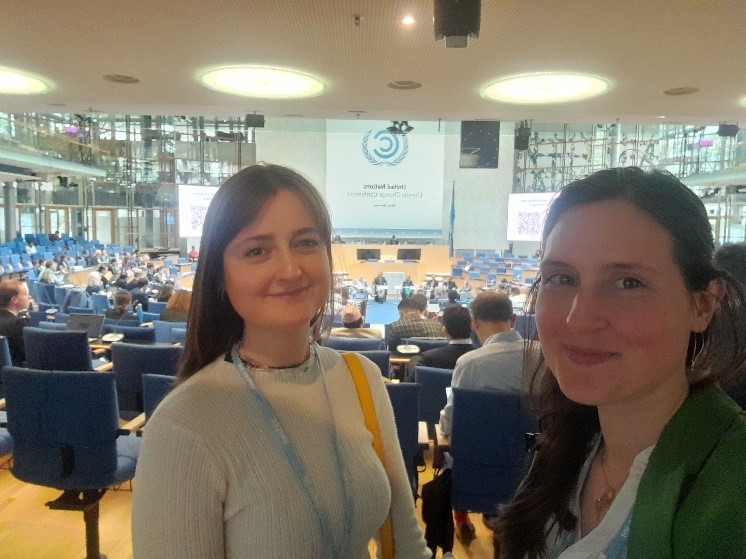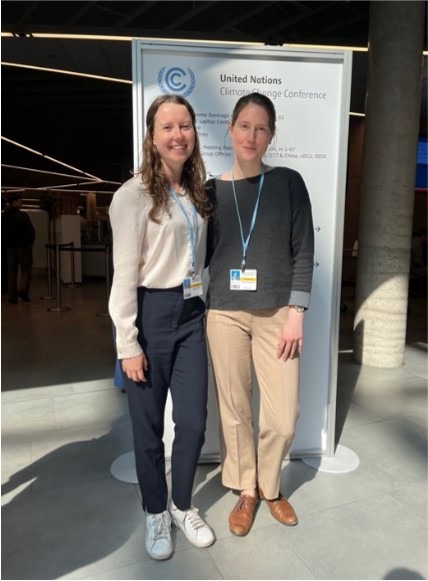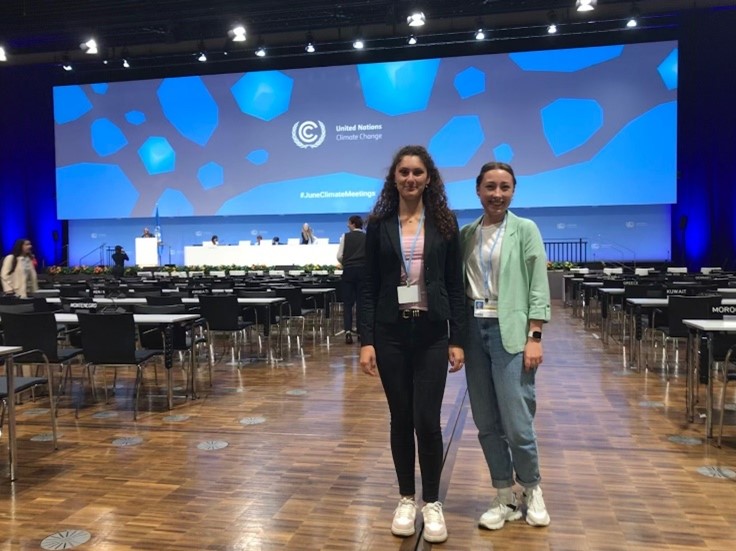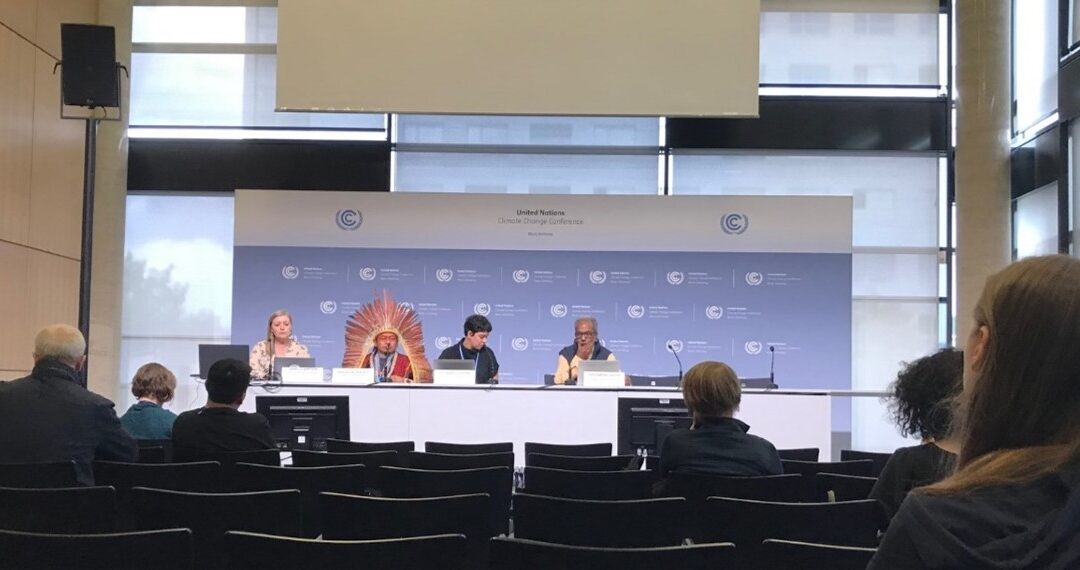From 3 to 13 June 2024, around 5,000 delegates from the Subsidiary Bodies (SB), i.e. the permanent subsidiary bodies of the Conference of the Parties to the Climate Convention, met for climate negotiations at the World Conference Center in Bonn.
The interim negotiations always take place between the COPs (Conference of the Parties) and serve as preparation for the subsequent COP event, which takes place in Baku, Azerbaijan, in autumn1.
At the start of the conference on 3 June, the queue at the entrance to the WCC was longer than usual, as the number of participants in Bonn was higher than ever, even though hardly any heads of state or government were present. Executive Secretary Simon Stiell opened the meeting and the chairs of the UNFCCC subsidiary bodies pointed out that the meeting had a record number of 30 mandated events and that the first mandated events had even taken place before the actual negotiations began2.
According to unfccc.int, the progress made in Bonn includes:
- Parties have streamlined the content of the new collective quantified target on climate finance. Clear options and the substantive framework of a draft decision must be finalised before COP29.
- Parties have taken steps towards adaptation indicators that are forward-looking, effective and science-based.
- Progress has been made towards a better functioning international carbon market, but there is still work to be done.
- Parties have worked together on transparency and supported each other in planning stronger climate action plans3.
Various members of the DKKV and the Young Professionals were also present at the SB60 as observers and were able to gather many impressions.
Some personal reports from our DKKV delegation on site you can read below. These are the personal impressions of four young professionals and two interns and do not claim to be accurate or complete.
A detailed summary of the SB60 can be found here: https://enb.iisd.org/sites/default/files/2024-06/enb12853e_0.pdf
Some impressions from the SB60:
WIM and Integrating Soil Health (04.06.)
A side event focussed on the Warsaw International Mechanism for Loss and Damage (WIM). This is an initiative that was founded during the 19th Conference of the Parties (COP19) in Warsaw, Poland, in 2013 and addresses the loss and damage caused by climate change. The main objectives of the WIM are:
- Improving understanding: Promoting knowledge and understanding of loss and damage caused by climate change, especially in developing countries that are particularly vulnerable.
- Strengthening coordination: Improving coordination and collaboration between different actors to support actions to address loss and damage.
- Supporting measures: Promote and support measures to address loss and damage through capacity building, technical support and financing.
The WIM plays an important role in supporting the most affected countries and communities by providing knowledge, promoting policies and strengthening international cooperation to mitigate and manage the impacts of climate change4.
Another side event dealt with the topic: Integrating Soil Health in NDCs. The abbreviation “NDCs” stands for “Nationally Determined Contributions” or ” national climate protection contributions”. These concepts are a central component of the Paris Agreement of 2015, in which the signatory states undertake to formulate and regularly update individual climate targets. The NDCs are not binding under international law, but the states must take measures to achieve the defined climate targets5.
The key points of the side event were that the challenges of climate change can only be overcome if the associated problems relating to soils and land are also taken into account. The question of the need for an international convention on soil and land to effectively address these important issues was raised. Global problems can be better tackled through partnerships, co-operation and co-ordination. Only through collective efforts and the exchange of knowledge and resources can we develop and implement effective strategies.
Another important topic is the measurement of carbon storage in the soil, which is very difficult. Nevertheless, maintaining soil health plays a crucial role, as it also has a positive impact on other sustainability goals (SDGs). However, a universal mechanism for solving soil and land problems does not seem possible, as solutions that work in some regions are not necessarily transferable to others. It is therefore always necessary to integrate local and indigenous knowledge in order to develop customised and effective approaches (text: Nina Senge – DKKV YP).
Inclusive urban climate resilience and the challenges of loss and damage: insight into current discussions and measures (5 – 6 June)
After rather slow discussions in Negotiations on Article 6 in the first event, the side event “Building inclusive urban climate resilience” was very exciting. Among other things, a case study on disaster management from the perspective of urban low-income groups was presented and the problems of climate and debt injustice were emphasised. The topic of Loss and Damage (L&D) continued throughout the two days. In the next side event “Practical Solutions enhancing national and local capacities to minimise and address loss and damage”, the UN World Food Programme (WFP) and the International Federation of Red Cross and Crescent Societies (IFRC), among others, presented their work on loss and damage and Vanuatu also reported on its current adaptation measures. One strong wish that was expressed was to move away from debt-based disaster risk financing. One way to do this, which was also chosen in the Nepal case study, was to finance insurance premiums through the L&D Fund (especially for people who were previously unable to pay for insurance). The negotiations on L&D the following day were extremely interesting, with some quite emotional contributions. The lack of or late payments after a loss event was clearly criticized. This highlighted the critical situation of the Small Island States compared to the (still) relatively calm situation in the West.
Another event was the press conference on the “Save Movement: How to address 1/3 of greenhouse gas emissions with a Plant Based Treaty”, which started with a scientific classification of the effects of meat consumption on the environment, followed by a young activist who explicitly addressed the social effects, particularly on indigenous populations, and then a presentation of the demands, including making the climate conferences plant-based. This demand was summarised very clearly and quite scathingly for the Bonn Climate Change Conference by former professional skier Heather Mills, in the sense that nobody who cares about the climate can still eat meat. Instead, she set up a food truck in front of the entrance to the WCCB, where you could get free vegan hot dogs (from her own brand).
In general, the topic of L&D was very present during these two days and there were also several events on the topic of Plant-Based Treaty. Particularly pleasing was the presence of young people, including many young activists
(text: Marie Grabka – DKKV YP and Lana Henzler – DKKV YP).
Technology and financing for sustainable NDCs: Insights and discussions at the Bonn Climate Change Conference (06 – 08 June)
At the side event “Making NDCs 3.0 ambitious and investment-ready through Technology Action Plans”, experiences and lessons learnt in relation to Technology Action Plans (TAPs) were discussed. During the opening remarks, James Grabert (Director Mitigation Division UNFCCC) emphasised: “No one can be left behind. We need solutions to ensure that all the necessary tools are available for implementing more sustainable NDCs.” The COP29 Chair reported on the current NDCs of Azerbaijan and the commitment to increase the share of renewable energy. The concepts of technology needs assessments and technology action plans were explained by the UNEP Copenhagen Climate Centre, followed by a panel discussion with speakers from Thailand, Brazil, GCF, GEF and UNIDO. The discussion focussed in particular on the common challenges in securing funding for the implementation of TAPs.
Another event, “Uniting across Rio Conventions for Land, Nature and Climate Action”, focussed on the Rio Conventions to facilitate knowledge sharing, strengthen technical and institutional capacities and facilitate access to financial and technological support. The opening remarks were delivered by Razan Al Mubarak (COP28 High Level Champion) and Nigar Arpadarai (COP29 High Level Champion). In addition, Bonn’s Mayor Katja Dörner spoke about the contribution of the cities that bring together the three Rio Conventions.
At an important event on disaster risk management, “Loss and damage data to accelerate climate action”, organised by UNDRR, many insights were given into data collection and how this contributes to the creation of early warning systems. Affected countries such as Ethiopia, Barbados, Malawi and Vanuata shared their very specific experiences of dealing with catastrophes, be it floods and storms in the case of SIDs or drought in Africa in particular. In particular, it became clear that many non-economic losses are still not taken into account and that it is very difficult to correctly assess slow-onset events without focussing only on major disasters. In addition, the correct link between impacts and the corresponding hazards is often not made, so there is a great need to improve knowledge management systems. The links between food systems and loss and damage were further addressed by showing the major differences between urban and rural areas (text: Isabel Wüst – DKKV YP).
From the rainforest to the ocean: The unheard voices of indigenous peoples and SIDS in the fight against climate change (12/06)
At the Bonn negotiations, CAN International presented regional perspectives that offered important insights into global climate policy. At 12:00 noon, the Global Forest Coalition spoke about the rights of indigenous peoples. In a panel, the Chief of the Ninawa Inu Huni Kui Federation, a defender of the rainforest, discussed the challenges related to REDD+ (Reducing Emissions from Deforestation and Forest Degradation). The chief shared the experiences of his people and emphasised that despite discussions and actions, no concrete results have been achieved to improve the lives of local people. Emissions continue to rise and water pollution in their areas remains a daily problem. He criticized the current models of conservation that do not work for the affected communities. He described these models as greenwashing, where companies pay for pollution without taking responsibility for the damage caused to the environment and people. One example of the negative consequences is that the financial compensation from REDD+ often does not help to improve the living conditions of the indigenous population, but rather enables the continuation of environmental destruction and social injustice.
Furthermore, the inefficiency of current institutional contracts in environmental protection was emphasized. Contracts and licenses allow wealthy individuals and corporations to continue polluting by simply buying their way out of their obligations. An example for this is the REDD+ project in indigenous peoples’ habitat, where indigenous people have little say and are deprived of many rights. Despite the large-scale measures, however, no significant improvement has been achieved. In fact, monetized contracts often led to increased conflict and did not represent a sustainable solution. A warning was also issued about the dangers of the emissions trading system, which is not only ineffective but also exacerbates existing problems. Current cases show how important it is to recognize and address these issues in order to find long-term and fair solutions for environmental protection.
There was also a major Oceans and Climate Change Dialogue at SB60 that day. There, the importance of marine biodiversity and coastal resilience was discussed. Furthermore, Denzel Atumurirava (AOSIS Fidji) spoke about the challenges facing the Small Island Developing States (SIDS):
- Impacts of climate change: such as sea level rise, rising water temperature, marine heatwaves, loss of marine biodiversity
- Lack of adequate funding: need for targeted climate finance to support research, capacity building and sustainable practices, as traditional funding often does not meet the specific needs of SIDS.
- Limited technological and scientific capacity: detailed and comprehensive data and ocean monitoring are needed to inform policy decisions.
In the further course of the dialogue, the case study “MeerWissen” by Gunnar Finke was presented. (text Sarah Mildenberger and Sophie Leifeld)
One point of criticism was that after two weeks of negotiations, the parties did not make much progress in defining the conditions for a new dialogue on the implementation of the GST result. “Not much thought was given to the details in general. Stubborn disagreements have been raised over the intended scope of the dialogue: Should it focus on the means of implementation, especially finance, or should it address the implementation of all elements of the GST decision?” (IISD, 2024). The discussions on the mitigation work programme were even more contentious. Parties could often not agree, not even on the call for intersessional submission or the inclusion of the discussions held in Bonn as the basis for discussions at the next meeting in Baku, Azerbaijan, in November 2024. Some groups and parties denounced the conduct of negotiations and emphasised that mitigation measures should not be a “taboo subject” in this process. Many also expressed disappointment at the lack of progress on the global adaptation goal, as well as the identification of research needs and the timeliness of the Intergovernmental Panel on Climate Change’s (IPCC) contributions to the discussions on research and systematic observation6.



Sources:
1 Vereinte Nationen (2024): SB60: Klimaverhandlungen starten in Bonn. https://unric.org/de/sb-60-klimaverhandlungen-starten-in-bonn/
2 IISD (2024): Highlights and images for 3 June 2024. https://enb.iisd.org/bonn-climate-change-conference-sbi60-sbsta60-3june24
3 United Nations (2024): June Climate Meetings Take Modest Steps Forward; Steep Mountain Still to Climb Ahead of COP29. https://unfccc.int/news/june-climate-meetings-take-modest-steps-forward-steep-mountain-still-to-climb-ahead-of-cop29
4 United Nations (o.J.): Warsaw International Mechanism for Loss and Damage associated with Climate Change Impacts. https://unfccc.int/topics/adaptation-and-resilience/workstreams/loss-and-damage/warsaw-international-mechanism
5 United Nations (o.J.): Nationally Determined Contributions (NDCs). https://unfccc.int/process-and-meetings/the-paris-agreement/nationally-determined-contributions-ndcs
6 IISD (2024): Summary of the 2024 Bonn Climate Change Conference: 3-13 June 2024. Earth Negotiations Bulletin. https://enb.iisd.org/sites/default/files/2024-06/enb12853e_0.pdf


